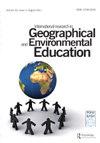莫桑比克学生对气候变化的知识和认知:在奔巴市的一项探索性研究
IF 3.1
Q2 EDUCATION & EDUCATIONAL RESEARCH
International Research in Geographical and Environmental Education
Pub Date : 2020-12-29
DOI:10.1080/10382046.2020.1863671
引用次数: 7
摘要
气候变化是当前人类面临的最严重的环境、社会和经济问题。正如《巴黎协定》第12条所述,教育是社会努力应对气候变化的根本支柱。有鉴于此,有必要制定一项气候变化教育(CCE)计划,以应对教育研究领域出现的挑战。这一任务的指导方针是基于对四个教育因素的研究:学生、教师、教与学的策略和方法以及教育目标。对这些因素的研究非常丰富;然而,缺乏关于非洲的这些研究。在这里,我们提出了一项探索性研究,主要针对彭巴(莫桑比克)的学生,旨在成为探索和发展CCE基础的第一步。我们采用了一份由38个封闭式项目组成的问卷,对256名莫桑比克学生(16-18岁)进行了调查。调查结果表明,学生们对气候变化的认识有限,对气候变化的人为原因有错误的看法,对责任和风险的认知水平较低。莫桑比克气候变化教育发展的进一步进展需要未来的研究来探索其他教育因素,目的是更准确地了解该国气候变化的教育现实。本文章由计算机程序翻译,如有差异,请以英文原文为准。
Mozambican students’ knowledge and perceptions about climate change: an exploratory study in Pemba City
Abstract Climate change is the most serious environmental, social, and economic problem humanity is currently facing. Education is a fundamental pillar for societies in their efforts to address climate change, as stated in Article 12 of the Paris Agreement. In view of this imperative, the need to develop a Climate Change Education (CCE) plan that would be up to the challenge arose in the field of educational research. The guidelines for such a task are based on the study of four educational factors: the students, the teachers, the teaching and learning strategies and methods, and the goals of education. Research on these factors is abundant; nevertheless, there is a lack of these studies concerning Africa. Here, we present an exploratory study which focuses on students in Pemba (Mozambique) and aims to be the first step in the exploration and development of a basis for CCE in this country. We employed a questionnaire consisting of 38 closed-end items which was administered to 256 Mozambican students (aged 16–18). Findings suggest that students declared a limited knowledge about climate change, erroneous beliefs about the anthropogenic causes of climate change, and low levels of responsibility and risk perception. Further progress in the development of CCE in Mozambique would require future research to explore other educational factors with the aim of building a more accurate image of the educational reality of climate change in this country.
求助全文
通过发布文献求助,成功后即可免费获取论文全文。
去求助
来源期刊

International Research in Geographical and Environmental Education
EDUCATION & EDUCATIONAL RESEARCH-
CiteScore
5.20
自引率
33.30%
发文量
11
期刊介绍:
International Research in Geographical & Environmental Education publishes quality research studies within the context of geographical and environmental education. The journal endeavours to promote international interest and dissemination of research in the field, provides a forum for critique, and demonstrates the relevance of research studies to good professional practice.
 求助内容:
求助内容: 应助结果提醒方式:
应助结果提醒方式:


